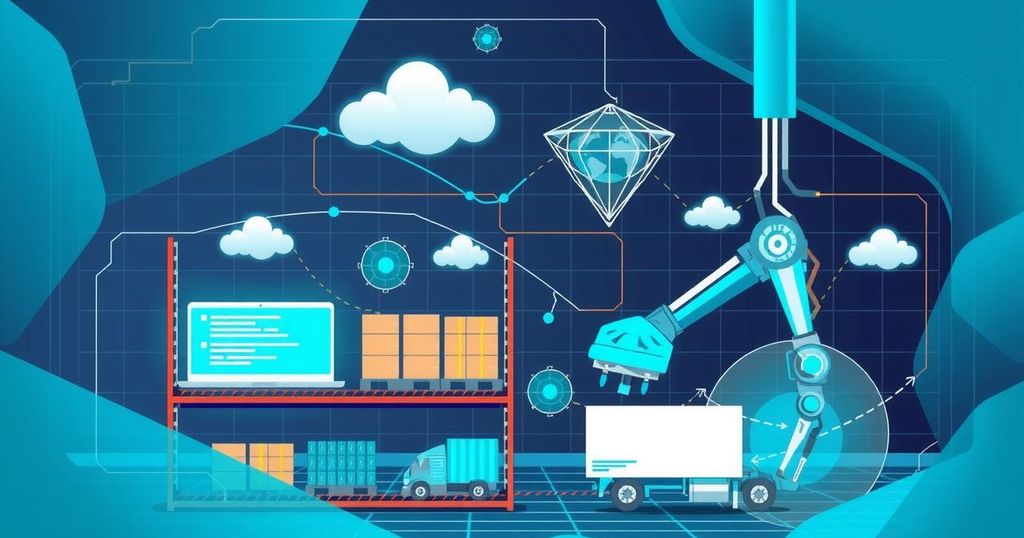Revolutionizing CPG Supply Chains: The Vital Role of Artificial Intelligence
The article discusses how artificial intelligence is modernizing CPG supply chains, emphasizing the need for resilience, speed, and adaptability. Traditional supply chains are under strain from unpredictable demands and external risks. AI improves demand forecasting, warehousing, logistics, and supplier management. Successful implementation requires a focus on data quality, change management, skill development, and ethical practices. This shift marks a movement towards smarter, more resilient supply chains.
The backbone of the consumer packaged goods (CPG) industry, supply chains are evolving beyond efficiency. In today’s climate, resilience, speed, and adaptability are essential due to shifting consumer behaviors and global disruptions. Traditional models face mounting pressures as forecasting becomes difficult and inventory decisions riskier, with every disruption capable of triggering cascading issues along the value chain.
Today’s supply chains are encountering several practical challenges. Demand is unpredictably fluctuating, driven by new consumer expectations around convenience and personalization. At the same time, outdated legacy systems contribute to fragmented data and delayed insights, complicating effective decision-making. External factors, such as geopolitical tensions and climate change, further heighten risks. Sustainability concerns are now baseline expectations from consumers and investors alike, indicating traditional models may no longer suffice.
Artificial intelligence has emerged as a crucial component in modernizing CPG supply chains. It is already helping these businesses navigate through their digital transformations by refining processes across various stages. Key improvements include smarter demand forecasting, where AI analyzes historical sales data and market trends to create more dynamic predictions. This leads to optimized stock levels and fewer instances of both overstock and stockouts.
In warehousing and fulfillment, AI automates stock placement and optimizes picking routes, minimizing errors while boosting efficiency. The logistics sector benefits from AI through real-time route planning and automated carrier selection, which reduces shipping delays and enhances service performance. Additionally, AI actively manages supplier risks by monitoring their performance and external factors, allowing companies to adapt proactively before problems escalate.
Implementing AI isn’t as simple as flipping a switch; it requires strategic planning. Organizations must prioritize data quality and integration to eliminate silos and ensure consistency. Change management is also crucial, as teams need to adapt to faster, data-driven methods. Moreover, recognizing skills gaps will help firms decide whether to upskill internally or collaborate with external experts to effectively utilize AI technology.
Ethics and accountability must also be addressed as AI’s role in decision-making grows. Companies need to ensure their AI applications are transparent, compliant with regulations, and resonate with the values streamlined through their digital transformation journey.
The transition in CPG supply chains moves from rigid traditional models to intelligent, agile systems through AI-driven solutions. Now is the moment to act decisively; leveraging AI strategically will foster resilient operations designed to handle future uncertainties. Whether just beginning or advancing in AI integration, taking proactive steps is vital in building a robust supply chain.
Birchman offers support for those exploring AI’s role in supply chain transformation, blending industry expertise with SAP capabilities to accelerate results effectively.
CPG supply chains are in a transformative phase, driven by the pressing need for resilience and adaptability. Artificial intelligence is a powerful tool enhancing traditional models, facilitating smarter forecasting, efficient operations, and proactive supplier risk management. However, successful AI implementation demands attention to data quality, cultural change, skills gaps, and ethical considerations. As businesses embrace AI strategically, they can ensure their supply chains are prepared for future challenges, making decisive shifts from reactive to resilient operations.
Original Source: techbullion.com




Post Comment